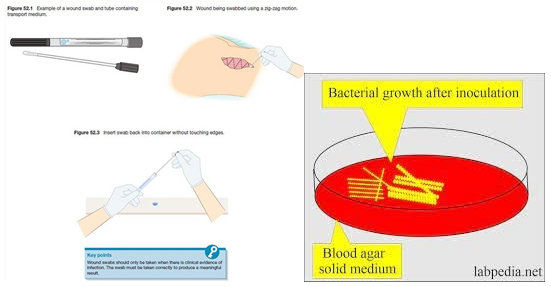On admission, the healthcare provider describes a broad spectrum of antibiotic, ticarcillin for a client with a gram-negative infection. Before administering the first dose, it is most important for the nurse to implement which prescription?
Monitor for signs of sodium and fluid retention.
Wound and blood specimen for culture and sensitivity.
Irrigation and tropical antibiotic application to wound area.
Complete the blood count and serum electrolytes.
The Correct Answer is B
Before administering the first dose of any antibiotic, it is essential to obtain a culture and sensitivity test to identify the causative organism and determine the most effective antibiotic to use. Administering a broad- spectrum antibiotic before obtaining a culture and sensitivity test may lead to the development of antibiotic-resistant strains of bacteria, making it more difficult to treat the infection in the future.
Options a, c, and d are not as important as obtaining a culture and sensitivity test. Monitoring for signs of sodium and fluid retention, irrigation and topical antibiotic application to the wound area, and completing blood count and serum electrolytes are important, but obtaining a culture and sensitivity test is the priority.

Nursing Test Bank
Naxlex Comprehensive Predictor Exams
Related Questions
Correct Answer is C
Explanation
Continuous rubbing of the back of the neck can be a side effect of antipsychotic medication, known as acute dystonia. Benztropine is an anticholinergic medication that can effectively treat acute dystonia. Therefore, the nurse should give a PRN prescription for benztropine to relieve the client's discomfort. Options a, b, and d do not address the underlying issue of acute dystonia and are not the best interventions for this particular situation.
Correct Answer is C
Explanation
Baclofen is a muscle relaxant medication used to treat muscle spasticity, which is a condition that causes muscles to become stiff and rigid. It works by reducing the activity of nerves in the brain and spinal cord that cause muscle spasms.
Option a, using stool softener as needed, is appropriate because baclofen can cause constipation as a side effect.
Option b, avoiding ingestion of alcohol, is also appropriate because alcohol can increase the sedative effects of baclofen and cause drowsiness or dizziness.
Option d, taking medication with meals, is recommended because it can help reduce stomach upset and nausea that may occur as a side effect of the medication.
Option c, discontinuing the medication when spasms cease, is incorrect because muscle spasticity is a chronic condition, and baclofen is used to manage symptoms over a prolonged period. Discontinuing the medication abruptly can cause withdrawal symptoms and exacerbate the spasticity. Therefore, the nurse should educate the client to take the medication as prescribed by the healthcare provider and not discontinue it without medical advice.

Whether you are a student looking to ace your exams or a practicing nurse seeking to enhance your expertise , our nursing education contents will empower you with the confidence and competence to make a difference in the lives of patients and become a respected leader in the healthcare field.
Visit Naxlex, invest in your future and unlock endless possibilities with our unparalleled nursing education contents today
Report Wrong Answer on the Current Question
Do you disagree with the answer? If yes, what is your expected answer? Explain.
Kindly be descriptive with the issue you are facing.
